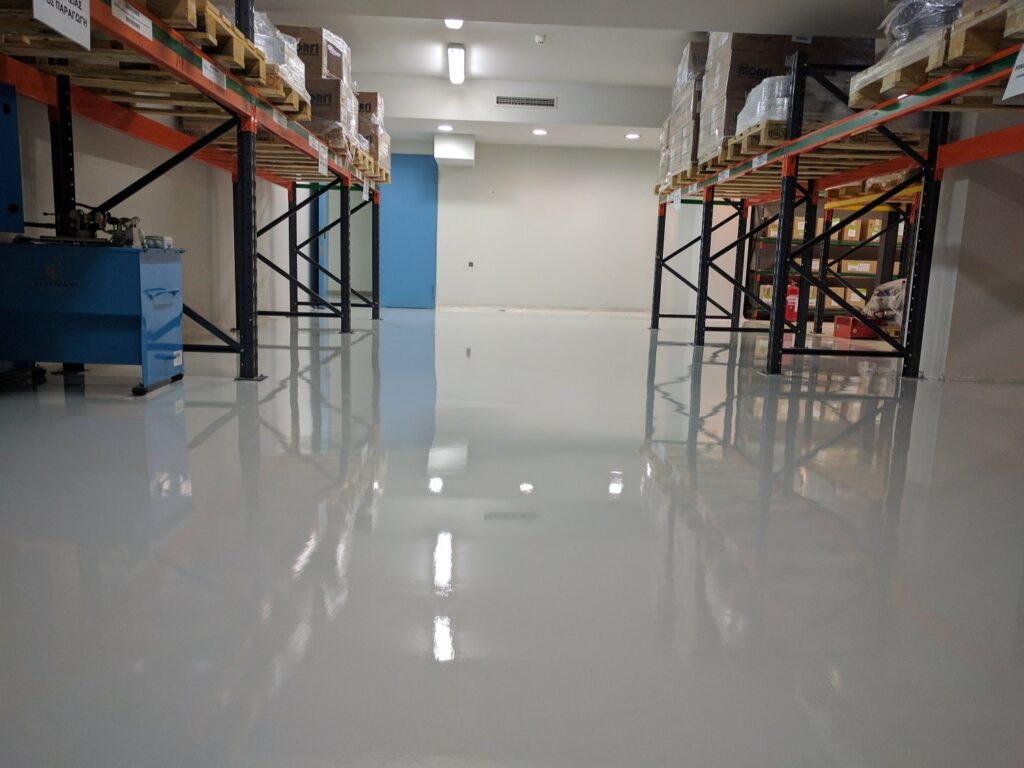When it comes to industrial flooring, choosing the right type of surface is a big decision. The floor must handle heavy machinery, high foot traffic, spills, and rough use — all without cracking, wearing out, or becoming unsafe.
Two common options are traditional flooring (like concrete, tiles, or vinyl) and epoxy floor coating. But which one is better for industrial use?
Let’s compare both based on key factors:
🔸 1. Durability
- Traditional Flooring: Concrete is strong but can chip or crack over time. Tiles may break under heavy weight, and vinyl wears out faster in busy environments.
- Epoxy Flooring: Epoxy forms a hard, seamless surface that resists impact, pressure, and abrasion. It handles forklifts, pallets, and heavy machinery easily.
✅ Winner: Epoxy Flooring
🔸 2. Maintenance
- Traditional Flooring: Requires regular maintenance — tiles may need replacement, grout can gather dirt, and concrete may need polishing or patching.
- Epoxy Flooring: Very low maintenance. Just mop or wipe clean. Its non-porous surface doesn’t absorb oil or chemicals.
✅ Winner: Epoxy Flooring
🔸 3. Safety
- Traditional Flooring: Can become slippery, cracked, or uneven, which may lead to accidents.
- Epoxy Flooring: Offers anti-slip, fire-resistant, and impact-resistant options. Also improves visibility with its glossy finish.
✅ Winner: Epoxy Flooring
🔸 4. Chemical Resistance
- Traditional Flooring: Concrete and tiles often get stained or damaged by chemicals used in industrial setups.
- Epoxy Flooring: Highly resistant to oils, acids, solvents, and chemicals, making it ideal for pharma, chemical, and food industries.
✅ Winner: Epoxy Flooring
🔸 5. Aesthetics & Customization
- Traditional Flooring: Limited styles, usually plain grey or basic tiles.
- Epoxy Flooring: Available in multiple colors, flake patterns, and finishes (like metallic or gloss). You can even mark safety zones using color-coded epoxy.
✅ Winner: Epoxy Flooring
🔸 6. Installation Time & Cost
- Traditional Flooring: Installation is slow and may take days to cure or set. Repairs are time-consuming.
- Epoxy Flooring: Can be applied quickly over new or old concrete. While the initial cost may be slightly higher, it’s cheaper in the long run due to low maintenance.
✅ Winner: Epoxy Flooring
✅ Final Verdict: Epoxy Is the Smarter Choice for Industrial Use
While traditional floors may still work for light commercial areas, epoxy flooring is far better for heavy-duty industrial spaces. It offers strength, safety, hygiene, and cost efficiency — all in one solution.
Whether you’re running a factory, warehouse, food processing unit, or lab, epoxy flooring is a long-term investment that pays off.
💬 Need Help Choosing the Right Flooring?
At Baroda Surface Protection Services, we specialize in industrial epoxy flooring tailored to your industry’s needs. From anti-slip coatings to chemical-resistant finishes, we deliver durable floors that work as hard as you do.
📞 Contact us today for a free consultation or site visit!

